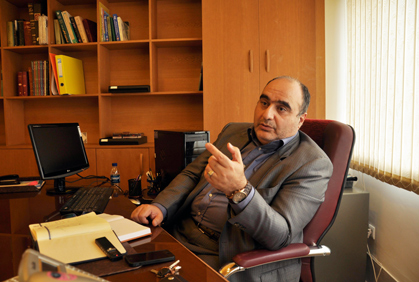 Iranian professor and expert on state terrorism says the Zionist regime is a clear cut example of terrorism.
Iranian professor and expert on state terrorism says the Zionist regime is a clear cut example of terrorism.
Professor Reza Simbar who received his PhD in International Relations from the University of New South Wales, says despite the Zionists crimes against Palestinians “nobody dares to issue a statement” against them.
“When it comes to us,” he added, “we will become terrorist, because they are at odds with us and we have a say in the region.”
Asked about the necessity of convergence across countries in the region and the world in dealing with terrorism, Simbar said, “the first and foremost problem of international organizations in the field of terrorism in both legal and political aspects is its definition.”
“This problems lies in all fields of political science such as freedom, justice and equality,” added the Scientific Secretary of the International Congress of 17000 Iranian Terror Victims. “The problem is the relativism in these concepts. Nobody calls himself terrorist.”
“There is actually no consensus over the definition of terrorism. Even the US and Europe which share many common grounds in political issues list different groups and individuals as terrorists,” Simbar said. “Taking a closer look at these lists shows that they are quite different up to 60 percent. This shows that it needs to be a cooperation and that the international system faces different kinds of operational challenges including defining terrorism.”
Asked whether it is possible to provide a global definition of terrorism or it is a cross-cultural phenomenon, Dr. Simbar said, “I’m on the opinion of a kind of absolutism.” “I believe that we should minimize the definition of terrorism, although it’s a heavy-going job to achieve a minimum common ground.”
Western countries define terrorism but their definitions seem to be more internal. Even when they present it at a universal level, it is their researchers who accept that and neither Muslims nor European countries agree with that.
He further made a reference to the paradoxical behavior of the western countries especially the US in dealing with terrorism and said, the way the US define terrorism is not too bad, but it acts otherwise when it comes to practice.
“When the genocide happened in Rwanda, the world pleaded the US to intervene to settle the chaos. Nobody helped in this chaos. Why? Because Rwanda has nothing but banana.”
“As an academic person I always believe that the Islamic Republic of Iran needs an academic link in the areas it had been facing since the very beginning,” he added.
“Terrorism is one of its prime examples, Human Rights and mass destruction are other examples. I’ve always been of the opinion that Iran’s diplomatic system needs to strengthen it ties with academic circles.”
He pointed out that working on only theoretical issues is a weakness of some Iranian universities.
“We as a country which is the victim of terrorism can play an active role in the development of international regimes related to terrorism,” he added.
“The UN International Law Commission, UN Commission on Human Rights, anti-terrorism conventions, our diplomatic representatives at the UN, and even offices of the UN in different countries are good platforms for academic discussions. An academic person should be familiar with the concerns.”
Referring to the 2nd International Congress of 17000 Iranian Terror Victims, Dr. Simbar said, “I view this conference with this approach.” “My concern is that the conference leads not only to a bunch of scientific papers but it also solves some problems our country is facing with, provides a strategy and be practical. More importantly, it ties the university with operational organs.”
He added that operational organs are not restricted to diplomatic system, but the security services, IRGC, Army, Parliament, Judiciary and its Human Rights Council.
He added that this link can be established during the International Congress of 17000 Iranian Terror Victims.
